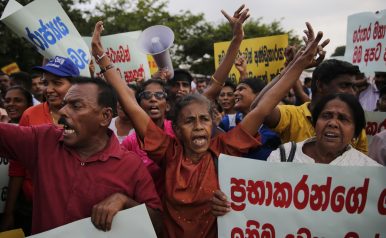International interest, not international laws, will deliver autonomy to Sri Lanka’s Tamils.
by Ana Pararajasingham, ‘The Diplomat,’ Washington, DC, November 7, 2017
The interim report on Sri Lanka’s proposed constitution released on September 21 has come under a spate of attacks. On October 24, a retired Sri Lankan army officer, Major General Kamal Gunaratne, insisted that those seeking to introduce the new constitution are traitors who must be killed. Four days earlier, Dayan Jayatilleka, a former diplomat, had called for rising up and confronting the prime minister, whom he identified as one of the architects of the interim proposals and in early October, a Sri Lankan academic, Asoka Bandarage, challenged the government’s legitimacy to change the constitution. Meanwhile, the all-powerful Buddhist clergy has firmly vetoed the proposals on the grounds that it would undermine Sri Lanka’s unitary governance.

Protesters opposing a proposed constitution shout slogans outside the parliament in Colombo, Sri Lanka (Oct. 30, 2017). Image Credit: AP Photo/Eranga Jayawardena
The opponents to the proposed constitution are incensed by the term “maximum devolution” used in the proposal, because it envisages devolving power to the Tamil-dominated Northern and Eastern Provinces. That the other seven Sinhala-dominated provinces will also be recipients of devolved power does not enter the argument; after all, the existing, highly centralized unitary constitution already vests power with the Sinhala people. Although it is widely recognized that it was the island’s unitary constitutions (enacted in 1948, 1972, and 1978), which ensured all political power resides with the numerically larger Sinhala people, were the root cause of the 26-year civil war, political power-sharing remains anathema to a significant section of the Sinhala political establishment.
The opposition to devolving political power to the Tamil-dominated Northern and Eastern provinces is driven by two well-ingrained notions. The first is the fear that increasing autonomy could pave the way for Tamils to secede. Second is the long-held belief that the island of Sri Lanka is a designated sanctuary for Theravada Buddhism, the purest form of Buddhism, and as such precludes political power sharing with non-Buddhists. This phenomenon is identified as “Political Buddhism.”
In actuality, any question of the Tamil-dominated northeast region seceding has been comprehensively addressed in the interim report, which categorically states that the country will remain an “indivisible united” entity. To make the position even more clear, the official Sinhala version of the interim proposal uses the word ēkīya (unitary in Sinhalese) to describe the constitution, while studiously avoiding the word unitary and federal in the English and Tamil versions. While this may well address the fear of secession, the mindset shaped by Political Buddhism remains a significant obstacle to enacting the proposed constitution.
Well aware of this hurdle, on October 30, Tamil parliamentarian MA Sumanthiran made a moving case for a political power sharing arrangement and concluded by pleading with every member of the Assembly to support the change. Such pleas were common in the Sri Lankan parliament during the first 30 years of its existence and were persistently ignored by the Sinhala polity, which enjoyed unrestrained political power under the unitary constitution. On two occasions, agreements reached with the Tamil leadership for a limited degree of autonomy were abandoned in the face of opposition no different than what is being voiced now. And it is likely that this plea too would fall on deaf ears. The scenario unfolding is eerily familiar, a classic case of “back to the future.” It is as if the civil war that tore the island apart had never happened!
Meanwhile, the chief minister of the Tamil–dominated Northern Province, CV Wigneswaran, convinced that Sinhala leadership is unlikely to willingly share political power, has argued that Sri Lanka’s Tamils should try to obtain their rights by resorting to international laws.
Realpolitik, however, tells us that it is not international law but international actors pursuing their own interests that dictates international intervention. Should Wigneswaran be able to factor into his argument that an autonomous northeast could help counter Beijing’s growing influence over Colombo, he may well succeed in winning international support for self-rule for Tamils within a united country.
Ana Pararajasingham was Director-Programmes with the Centre for Just Peace and Democracy (CJPD). He is the author “Sri Lanka’s Endangered Peace Process and the Way Forward” (2007) and editor of “Sri Lanka 60 Years of ‘independence and Beyond” (2009).
https://thediplomat.com/2017/11/sri-lankas-proposed-constitution-comes-under-attack/